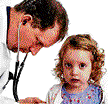Almost one in 10 children admitted to hospitals catch infections, mostly respiratory, during their medical care that made them sicker rather than better, a British study has found.

A survey of more than 50,000 patients admitted in more than 100 hospitals in UK has found that one in 16 children had an infection associated with their health care.
Most of the hospital-acquired infections were respiratory such as pneumonia, urinary tract infections and surgical site infections, according to the study carried out by UK’s Health Protection Agency in England last October and November.
The survey included infections in children for the first time and found that one in 20 aged under 15 had an infection rising to one in five of very sick children.
Susan Hopkins, a health care epidemiologist and author of the report, said: “Some of these children are very sick and have serious underlying conditions which are expected to limit their life expectancy.”
“Unfortunately the more procedures they are exposed to the greater the likelihood they will develop an infection,” Hopkins was quoted as saying by the Daily Telegraph.
According to the report, bugs were most common in the very young, with 8.2 per cent (or one in every 12) of children aged between one month and 23 months being infected, and the elderly, with 7.4 per cent of those aged 65 to 74 carrying infections.
While the overall number of infections is in decline, the researchers warned that many bugs are becoming resistant to antibiotics due to overprescription.
Of the bugs identified, one in eight were resistant to common antibiotics including organisms such as E.coli which can live in the gut and be transferred to the bloodstream during surgery, or when tubes are inserted into the veins.